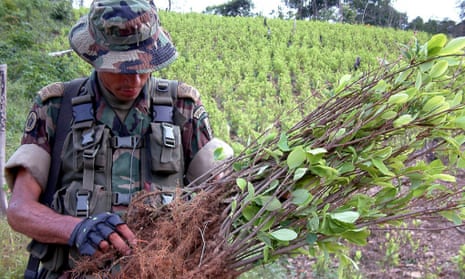Colombia’s health ministry is recommending the immediate suspension of aerial spraying of glyphosate – a herbicide that is the cornerstone of US-financed efforts to wipe out cocaine crops.
The ministry on Monday made its decision after the World Health Organisation’s research arm said last month that glyphosate – originally sold as Roundup – was probably carcinogenic in humans.
The Colombian authorities said they were acting in accordance with a constitutional court ruling requiring them to take precautions whenever credible health risks were apparent.
President Juan Manuel Santos has yet to respond to the ministry’s recommendation.
More than 1.6m hectares (4m acres) of land in Colombia has been sprayed with the weed killer over the past two decades to kill coca plants. Coca leaves are used to make cocaine. The spraying program is partly carried out by US contractors.
The Associated Press contributed to this report

Comments (…)
Sign in or create your Guardian account to join the discussion